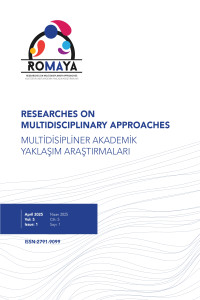Nonnative Pre-Service EFL Teachers’ Perceptions of Native and Non- Native English-Speaking Teachers: an Exploration in Turkish Contexts
Öz
This mixed-methods study delves into the perceptions of Turkish EFL Pre-service Teachers regarding native English-speaking teachers (NESTs) and non-native English-speaking teachers (NNESTs) and explores the potential impact of being an NNEST on their future teaching practices. In order to identify their perceptions, a questionnaire was conducted with 41 participants and the data were analyzed via descriptive statistics. In the qualitative part, open-ended questions were directed to the participants to elucidate how they think being NNEST might impact their future teaching practices. Responses were scrutinized using thematic analysis. The overall results indicated that Turkish EFL pre-service teachers recognized English can be taught effectively by both NESTs and NNESTs. They perceived having empathy in understanding students’ needs and difficulties as the main advantage of being NNEST while expressing concerns about potential disadvantages for
their future practices such as nonnative pronunciation and language proficiency. On the other hand, being more self-confident and competent in using the English Language as well as teaching vocabulary, listening skills, and fluency better were the perceived main advantages of NESTs. Having a shared mother tongue with the students was considered both an advantage and a disadvantage.
Anahtar Kelimeler
Native English-Speaking Teachers (Nests) Non-Native English-Speaking Teachers (Nnests) Pre-Service Teachers English Language Teaching Teacher Perceptions
Kaynakça
- Bayyurt, Y. (2018). Equity and inclusivity for NESTS and NNESTs. The TESOL Encyclopedia of English Language Teaching, 1–6. doi: 10.1002/9781118784235.eelt0017.
- Boyraz, S., Altınsoy, E., & Çıtak, T. (2018). Preservice ELT teachers’ native non-native language teacher perception. Journal of Modern Science, 38(3), 73–86. doi: doi.org/10.13166/jms/95054.
- Clarke, V. & Braun, V. (2017). Thematic analysis. The Journal of Positive Psychology, 12(3), 297-298. doi: 10.1080/17439760.2016.1262613.
Öz
Kaynakça
- Bayyurt, Y. (2018). Equity and inclusivity for NESTS and NNESTs. The TESOL Encyclopedia of English Language Teaching, 1–6. doi: 10.1002/9781118784235.eelt0017.
- Boyraz, S., Altınsoy, E., & Çıtak, T. (2018). Preservice ELT teachers’ native non-native language teacher perception. Journal of Modern Science, 38(3), 73–86. doi: doi.org/10.13166/jms/95054.
- Clarke, V. & Braun, V. (2017). Thematic analysis. The Journal of Positive Psychology, 12(3), 297-298. doi: 10.1080/17439760.2016.1262613.
Ayrıntılar
| Birincil Dil | İngilizce |
|---|---|
| Konular | Dil Çalışmaları (Diğer) |
| Bölüm | 2025 5/1 (April) |
| Yazarlar | |
| Yayımlanma Tarihi | 22 Nisan 2025 |
| Gönderilme Tarihi | 22 Ocak 2025 |
| Kabul Tarihi | 18 Şubat 2025 |
| Yayımlandığı Sayı | Yıl 2025 Cilt: 5 Sayı: 1 |


